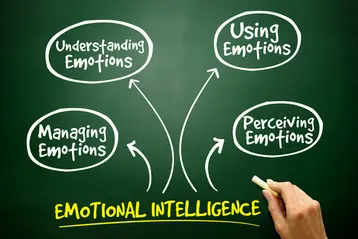Do You Know Your Emotional Intelligence? It Can Define Your Career Success

Guest post by Structured GI Leadership
Emotions have no place in the workplace - or do they? We are all humans and emotions make us just that. Your emotional intelligence is, essentially, your ability to recognize and control your own emotions and emotional reactions. It means being in touch with how you’re feeling and the feelings of those around you, then using that awareness – as opposed to your emotional reactions - to guide your thoughts and behaviors.
In the workplace, your emotional intelligence determines how your employees will view you and respond to you. While many think of emotions as being inappropriate for the workplace, your emotional intelligence can actually define your career path. People will not follow those they cannot trust and people will not trust those whose emotional IQ they cannot read.
The five key aspects of emotional intelligence
- Social skills: This is more than the ability to make friends at the team happy hour or network at the annual holiday party. Social skills allow you to influence others, build team collaboration, communicate effectively and mediate when there are disagreements.
- Self-regulation: Self-regulation involves the ability to control one’s actions and behaviors, as well as the ability to communicate information with the appropriate body language and style. People who self-regulate can eliminate challenges and obstacles while remaining trustworthy and credible.
- Motivation: Motivation takes personal commitment, initiative and drive to keep going when most would give up. Emotionally intelligent people take responsibility for finding their own incentive to get going.
- Self-awareness: Self-awareness is about knowing both your strengths and weakness. It is also about knowing how others perceive you and taking steps to make sure you are positioning yourself at work and to others in a professional way.
- Empathy: A simple definition of empathy is the feeling that you understand and share another person's experiences and emotions. A little bit of empathy can go a long way when navigating the landscape of office politics, as well as embracing a culture of belonging.
Becoming an emotionally intelligent leader Building and managing a high emotional intelligence – the kind that will help you succeed in your career – can be done by focusing on these three mindful strategies:
1) Change your thoughts: If you want to change your thoughts to be more productive and conducive to the work environment, you have to become fully aware of your own thinking patterns. When faced with a difficult situation, does your mind first jump to what can go wrong? The ancient adage is true: your thoughts become words, which then become actions, which then become habits, which then become your character, which then becomes your destiny.
Make it a point, when negative or harmful thoughts creep in throughout the day, to catch them. Then ask yourself where that thought came from and how it drives your behavior. From there, consciously replace this negative thought with a more positive, effective one and monitor how it changes your work environment over time.
2) Mind your nonverbal cues: Your nonverbal communications can actually contradict your verbal communications by sending the wrong message. Let’s review a few:
- Posture – Your confidence shows in how well you hold your spine straight and your head high.
- Eye contact – The three-second rule is great when it comes to judging how much eye contact to make. A long gaze can seem aggressive or creepy, while not making eye contact shows a lack of confidence or makes your words seem less trustworthy.
- Arms crossed – Don’t do this. It makes you look closed off and defensive.
- Hands clasped – This comes off as anger or tension and makes others uncomfortable.
- Tapping/drumming fingers – Tapping your fingers shows impatience and restlessness – plus, it’s distracting.
Remember, nonverbal cues are extremely important to conveying your message. If there is a disconnect between your verbal and nonverbal communication, people are more likely to accept and believe your nonverbal cues.
3) Change your circle: Experts say that you are the sum of the five people with whom you spend the most time. Who are you spending your time with at work? For instance, if you want to be a catalyst for change in your organization, do you fraternize with colleagues who are content with the way things have always been done? Behaviors and emotions can be contagious. If you socialize with negative people or stagnant people, eventually your outlook and perspective on things will become negative and stagnant. If you socialize with innovative, honest people who are willing to work hard to facilitate positive change, then your outlook and perspective will follow.
While showing too much emotion inappropriately can take you down a dangerous career path, not showing enough emotion can stall your career growth. Without emotional intelligence, the ability to motivate, collaborate or effect change is nearly impossible. Manage your emotions – or they will manage you!
This communication is for informational purposes only; it is not legal, tax or accounting advice; and is not an offer to sell, buy or procure insurance. This post may contain hyperlinks to websites operated by parties other than TriNet. Such hyperlinks are provided for reference only. TriNet does not control such web sites and is not responsible for their content. Inclusion of such hyperlinks on TriNet.com does not necessarily imply any endorsement of the material on such websites or association with their operators.






